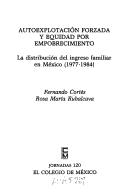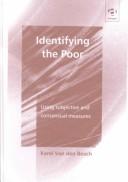| Listing 1 - 10 of 26 | << page >> |
Sort by
|

ISBN: 9264197370 9786610083756 1280083751 9264175067 Year: 2002 Publisher: Paris Organization for Economic Cooperation and Development
Abstract | Keywords | Export | Availability | Bookmark
 Loading...
Loading...Choose an application
- Reference Manager
- EndNote
- RefWorks (Direct export to RefWorks)
This book provides a comprehensive analysis of household consumption patterns in five key areas: food, tourism-related travel, energy, water and waste generation. It brings together the various elements of household consumption that are necessary to better understand consumption trends and to identify the best policy options towards sustainable consumption. These include data on household consumption trends and drivers, environmental impacts, policy responses and policy recommendations. The analysis shows that environmental impacts from household activities have worsened over the last three decades and are expected to intensify even more over the next twenty years, particularly in the areas of energy, transport and waste if strong and comprehensive policies are not implemented. The book provides a framework and outlines the objectives of policies to promote sustainable consumption. It analyses the effectiveness of different types of policy instruments (regulatory, economic, social) in influencing consumer decision-making, and identifies combinations of instruments for promoting more sustainable consumption.
National consumption --- Economic policy and planning (general) --- Sociology of the family. Sociology of sexuality --- Consumption (Economics) --- Cost and standard of living --- Sustainable development --- Development, Sustainable --- Ecologically sustainable development --- Economic development, Sustainable --- Economic sustainability --- ESD (Ecologically sustainable development) --- Smart growth --- Sustainable economic development --- Economic development --- Comfort, Standard of --- Cost of living --- Food, Cost of --- Household expenses --- Living, Cost of --- Living, Standard of --- Standard of living --- Home economics --- Households --- Quality of life --- Wealth --- Luxury --- Prices --- Purchasing power --- Wages --- Consumer demand --- Consumer spending --- Consumerism --- Spending, Consumer --- Demand (Economic theory) --- Environmental aspects --- Surveys --- Economics
Periodical
ISSN: 20401647 Year: 1991 Publisher: London : H.M.S.O.,
Abstract | Keywords | Export | Availability | Bookmark
 Loading...
Loading...Choose an application
- Reference Manager
- EndNote
- RefWorks (Direct export to RefWorks)
Cost and standard of living --- Gezinsbudgetten. --- Inkomen. --- Cost and standard of living. --- Great Britain. --- Comfort, Standard of --- Cost of living --- Food, Cost of --- Household expenses --- Living, Cost of --- Living, Standard of --- Standard of living --- Anglia --- Angliyah --- Briṭanyah --- Grande-Bretagne --- Grossbritannien --- Marea Britanie --- Nagy-Britannia --- Prydain Fawr --- Royaume-Uni --- Saharātchaʻānāčhak --- Storbritannien --- United Kingdom --- United Kingdom of Great Britain and Ireland --- United Kingdom of Great Britain and Northern Ireland --- Velikobritanii︠a︡ --- Wielka Brytania --- Consumption (Economics) --- Home economics --- Households --- Quality of life --- Wealth --- Luxury --- Prices --- Purchasing power --- Wages --- Surveys --- Northern Ireland --- Scotland --- Wales --- Great Britain --- England and Wales --- Velikobritanii͡ --- Förenade kungariket --- Grã-Bretanha --- Igirisu --- Iso-Britannia --- Yhdistynyt kuningaskunta
Book
ISBN: 1462300308 1452753113 1282841092 9786612841095 1451870167 1451914695 Year: 2008 Volume: WP/08/158 Publisher: Washington, D.C. : International Monetary Fund,
Abstract | Keywords | Export | Availability | Bookmark
 Loading...
Loading...Choose an application
- Reference Manager
- EndNote
- RefWorks (Direct export to RefWorks)
There is world-wide convergence in life expectancy, despite little convergence in GDP per capita. If one values longer life much more than material happiness, the world living standards may this have already converged substantially. This paper introduces the concept of the dynastic general equilibrium value of life to measure welfare gains from the increase in life expectancy. A calibration study finds sizable welfare gains, but these gains hardly mitigate the large inequality among countries. A conventional GDP-based measure remains a good approximation for (non) convergence in world living standards, even when adjusted for changes in life expectancy.
Life expectancy --- Income --- Cost and standard of living --- Convergence (Economics) --- Econometric models. --- Economic convergence --- Comfort, Standard of --- Cost of living --- Food, Cost of --- Household expenses --- Living, Cost of --- Living, Standard of --- Standard of living --- Family income --- Fortunes --- Household income --- Personal income --- Expectancy of life --- Expectation of life --- Economics --- Consumption (Economics) --- Home economics --- Households --- Quality of life --- Wealth --- Luxury --- Prices --- Purchasing power --- Wages --- Finance --- Property --- Gross national product --- Profit --- Life spans (Biology) --- Vital statistics --- Premature death --- Surveys --- Insurance --- Labor --- Macroeconomics --- Human Capital --- Skills --- Occupational Choice --- Labor Productivity --- Health: General --- Aggregate Factor Income Distribution --- Macroeconomics: Consumption --- Saving --- Insurance Companies --- Actuarial Studies --- Labour --- income economics --- Health economics --- Insurance & actuarial studies --- Human capital --- Health --- Consumption --- United States

ISBN: 9681204816 607628580X Year: 1991 Publisher: El Colegio de México
Abstract | Keywords | Export | Availability | Bookmark
 Loading...
Loading...Choose an application
- Reference Manager
- EndNote
- RefWorks (Direct export to RefWorks)
El presente trabajo, basado en datos de las encuestas nacionales sostiene que la caída de los salarios reales en México provocó que las familias en defensa de sus condiciones de vida, echaran mano de todos los medios a su alcance para contrabalancear la disminución de sus ingresos
Sociology of work --- Mexico --- Income distribution. --- Households. --- Cost and standard of living. --- Households --- Cost and standard of living --- Income distribution --- Mexico. --- Population --- Families --- Home economics --- Comfort, Standard of --- Cost of living --- Food, Cost of --- Household expenses --- Living, Cost of --- Living, Standard of --- Standard of living --- Consumption (Economics) --- Quality of life --- Wealth --- Luxury --- Prices --- Purchasing power --- Wages --- Distribution of income --- Income inequality --- Inequality of income --- Distribution (Economic theory) --- Disposable income --- Surveys --- Anáhuac --- Estados Unidos Mexicanos --- Maxico --- Méjico --- Mekishiko --- Meḳsiḳe --- Meksiko --- Meksyk --- Messico --- Mexique (Country) --- República Mexicana --- Stany Zjednoczone Meksyku --- United Mexican States --- United States of Mexico --- מקסיקו --- メキシコ --- Income Distribution --- Cost And Standard Of Living --- Monetary economics
Book
ISBN: 1484341783 1498325955 Year: 2014 Publisher: Washington, D.C. : International Monetary Fund,
Abstract | Keywords | Export | Availability | Bookmark
 Loading...
Loading...Choose an application
- Reference Manager
- EndNote
- RefWorks (Direct export to RefWorks)
This Selected Issues paper analyzes the housing prices, consumption, and the household debt overhang in the Netherlands. Deflated housing prices that were fueled by robust borrowing often leave in their wake households with heavy debt burden. This “debt overhang” forces households into deleveraging—reducing their level of debt to sustainable levels. When deleveraging is brought about through reduced household consumption, it can contribute to a protracted “balance sheet recession” as appears to be the case in the Netherlands. This paper estimates a simultaneous equations model of the Dutch economy using a three-stage least squares approach. Empirical results are supportive of the hypothesis that housing prices strongly affect private consumption.
Cost and standard of living --- Debt --- Housing --- Finance --- Indebtedness --- Comfort, Standard of --- Cost of living --- Food, Cost of --- Household expenses --- Living, Cost of --- Living, Standard of --- Standard of living --- Consumption (Economics) --- Home economics --- Households --- Quality of life --- Wealth --- Luxury --- Prices --- Purchasing power --- Wages --- Surveys --- Corporate Finance --- Infrastructure --- Macroeconomics --- Real Estate --- Industries: Financial Services --- Housing Supply and Markets --- Economic Development: Urban, Rural, Regional, and Transportation Analysis --- Banks --- Depository Institutions --- Micro Finance Institutions --- Mortgages --- Macroeconomics: Consumption --- Saving --- Corporate Finance and Governance: General --- Property & real estate --- Ownership & organization of enterprises --- Monetary economics --- Housing prices --- Consumption --- Small and medium enterprises --- National accounts --- Financial institutions --- Economic sectors --- Saving and investment --- Economics --- Small business --- Netherlands, The
Book
ISBN: 3428449045 3428049047 Year: 2020 Publisher: Berlin : Duncker & Humblot,
Abstract | Keywords | Export | Availability | Bookmark
 Loading...
Loading...Choose an application
- Reference Manager
- EndNote
- RefWorks (Direct export to RefWorks)
Cost and standard of living. --- Intergovernmental fiscal relations. --- Federal government. --- Economic policy. --- Economic nationalism --- Economic planning --- National planning --- State planning --- Economics --- Planning --- National security --- Social policy --- Division of powers --- Federal government --- Federal-provincial relations --- Federal-state relations --- Federal systems --- Federalism --- Powers, Division of --- Provincial-federal relations --- State-federal relations --- Political science --- Central-local government relations --- Decentralization in government --- Federal-state fiscal relations --- Fiscal relations, Intergovernmental --- State-local fiscal relations --- Finance, Public --- Local finance --- Comfort, Standard of --- Cost of living --- Food, Cost of --- Household expenses --- Living, Cost of --- Living, Standard of --- Standard of living --- Consumption (Economics) --- Home economics --- Households --- Quality of life --- Wealth --- Luxury --- Prices --- Purchasing power --- Wages --- Law and legislation --- Surveys

ISBN: 0754618366 Year: 2001 Publisher: Aldershot Ashgate
Abstract | Keywords | Export | Availability | Bookmark
 Loading...
Loading...Choose an application
- Reference Manager
- EndNote
- RefWorks (Direct export to RefWorks)
Quantitative methods in social research --- Social stratification --- Poor --- Poverty --- Cost and standard of living --- Pauvres --- Pauvreté --- Coût et niveau de la vie --- Identification --- Research --- Evaluation --- Case studies --- Recherche --- Etudes de cas --- -Poverty --- -#A0203A --- 666 Armoede --- AA / International- internationaal --- BE / Belgium - België - Belgique --- 339.21 --- Destitution --- Wealth --- Basic needs --- Begging --- Subsistence economy --- Disadvantaged, Economically --- Economically disadvantaged --- Impoverished people --- Low-income people --- Pauperism --- Poor, The --- Poor people --- Persons --- Social classes --- Comfort, Standard of --- Cost of living --- Food, Cost of --- Household expenses --- Living, Cost of --- Living, Standard of --- Standard of living --- Consumption (Economics) --- Home economics --- Households --- Quality of life --- Luxury --- Prices --- Purchasing power --- Wages --- -Evaluation --- Ongelijkheid en herverdeling van vermogens en inkomens. Inkomensbeleid. --- Economic conditions --- Surveys --- Pauvreté --- Coût et niveau de la vie --- #A0203A --- Research&delete& --- Ongelijkheid en herverdeling van vermogens en inkomens. Inkomensbeleid --- Evaluation. --- Case studies.
Periodical
ISSN: 14699915 14636778 Year: 1999 Publisher: Basingstoke, UK : [Abingdon] : Carfax Pub., Taylor & Francis Ltd., Routledge, Taylor & Francis
Abstract | Keywords | Export | Availability | Bookmark
 Loading...
Loading...Choose an application
- Reference Manager
- EndNote
- RefWorks (Direct export to RefWorks)
Genetic engineering --- Biotechnology --- Genetic Engineering --- Genetics --- Social Change --- Socioeconomic Factors --- Social aspects --- Genetic Engineering. --- Biotechnology. --- Genetics. --- Social Change. --- Socioeconomic Factors. --- Social aspects. --- Modernization --- Social Development --- Social Impact --- Change, Social --- Changes, Social --- Development, Social --- Developments, Social --- Impact, Social --- Impacts, Social --- Social Changes --- Social Developments --- Social Impacts --- Factors, Socioeconomic --- High-Income Population --- Inequalities --- Land Tenure --- Standard of Living --- Factor, Socioeconomic --- High Income Population --- High-Income Populations --- Inequality --- Living Standard --- Living Standards --- Population, High-Income --- Populations, High-Income --- Socioeconomic Factor --- Tenure, Land --- Biotechnologies --- Engineering, Genetic --- Intervention, Genetic --- Genetic Intervention --- Genetic Interventions --- Interventions, Genetic --- Designed genetic change --- Gene splicing --- Genetic intervention --- Genetic surgery --- Group Processes --- Genetic Structures --- Genetic Phenomena --- Economics --- Cloning, Molecular --- DNA, Recombinant --- Industrial Microbiology --- Artificial Gene Fusion --- Organisms, Genetically Modified --- Animals, Genetically Modified --- Plants, Genetically Modified --- Chemical engineering --- Genetic recombination --- Transgenic organisms --- Social Sciences - General --- Social Inequalities --- Social Inequality --- Inequalities, Social --- Inequality, Social --- Economic and Social Factors --- Social and Economic Factors --- Socioeconomic Characteristics --- Characteristic, Socioeconomic --- Socioeconomic Characteristic
Book
ISBN: 1451863519 1462303390 1451908865 9786613825834 1452709785 1283513382 Year: 2006 Publisher: Washington, D.C. : International Monetary Fund,
Abstract | Keywords | Export | Availability | Bookmark
 Loading...
Loading...Choose an application
- Reference Manager
- EndNote
- RefWorks (Direct export to RefWorks)
Using an input-output approach, this paper assesses the distributional effects of a rise in various petroleum product prices in Mali. The results show that, although rising gasoline and diesel prices affect mainly nonpoor households, rising kerosene prices are most harmful to the poor. Overall, the impact of fuel prices on household budgets displays a U-shaped relationship with expenditure per capita. Regardless of the oil product considered, highincome households would benefit disproportionately from oil price subsidies. This suggests that a petroleum price subsidy is an ineffective mechanism for protecting the income of poor households compared with a targeted subsidy.
Cost and standard of living -- Economic aspects -- Mali. --- Electronic books. -- local. --- Petroleum industry and trade -- Subsidies -- Mali. --- Petroleum products -- Economic aspects -- Mali -- Econometric models. --- Business & Economics --- Labor & Workers' Economics --- Cost and standard of living --- Petroleum industry and trade --- Petroleum products --- Economic aspects --- Subsidies --- Econometric models. --- Mazut --- Comfort, Standard of --- Cost of living --- Food, Cost of --- Household expenses --- Living, Cost of --- Living, Standard of --- Standard of living --- Petroleum --- Hydraulic fluids --- Energy industries --- Oil industries --- Consumption (Economics) --- Home economics --- Households --- Quality of life --- Wealth --- Luxury --- Prices --- Purchasing power --- Wages --- Refining --- Surveys --- Investments: Energy --- Inflation --- Macroeconomics --- Public Finance --- General Equilibrium and Disequilibrium: Input-Output Tables and Analysis --- Energy: Demand and Supply --- Price Level --- Deflation --- Energy: General --- National Government Expenditures and Related Policies: General --- Investment & securities --- Public finance & taxation --- Energy industries & utilities --- Oil prices --- Oil --- Expenditure --- Energy subsidies --- Commodities --- Expenditures, Public --- Mali
Book
ISBN: 1475551495 Year: 2016 Publisher: Washington, D.C. : International Monetary Fund,
Abstract | Keywords | Export | Availability | Bookmark
 Loading...
Loading...Choose an application
- Reference Manager
- EndNote
- RefWorks (Direct export to RefWorks)
Debt amortization requirements have been suggested as a way to reduce household indebtedness. However, a closer look reveals that amortization requirements may create incentives for both borrowers and lenders to borrow and lend more rather than less. Suppose that a household plans to finance a given housing purchase through a preferred future mortgage path. If that mortgage path violates a new amortization requirement, the household can still achieve its preferred mortgage path, net after savings, by initially borrowing more, investing the excess borrowing in a savings account, and fulfilling the amortization requirement by withdrawals from the savings account over time. This is obvious, if the savings interest rate equals the mortgage rate, because then the excess borrowing is costless. But even if the savings interest rate is less than the debt interest rate, so that the excess borrowing is costly, there remains a strong incentive to initially borrow more than without an amortization requirement. Furthermore, under these circumstances, it is profitable and quite riskless for banks to let borrowers borrow more and invest the excess borrowing in a savings account in the bank, giving lenders an incentive to lend more, not less, than without amortization requirements. Thus, amortization requirements as a way of reducing household indebtedness may be counterproductive.
Cost and standard of living. --- Debt --- Mortgages --- Hypothecation --- Real obligations --- Securities --- Security (Law) --- Conveyancing --- Housing --- Liens --- Priorities of claims and liens --- Indebtedness --- Finance --- Comfort, Standard of --- Cost of living --- Food, Cost of --- Household expenses --- Living, Cost of --- Living, Standard of --- Standard of living --- Consumption (Economics) --- Home economics --- Households --- Quality of life --- Wealth --- Luxury --- Prices --- Purchasing power --- Wages --- Law and legislation --- Surveys --- Exports and Imports --- Infrastructure --- Macroeconomics --- Real Estate --- Intertemporal Consumer Choice --- Life Cycle Models and Saving --- Financial Markets and the Macroeconomy --- Banks --- Depository Institutions --- Micro Finance Institutions --- Urban, Rural, and Regional Economics: Housing Demand --- International Lending and Debt Problems --- Economic Development: Urban, Rural, Regional, and Transportation Analysis --- Aggregate Factor Income Distribution --- Macroeconomics: Consumption --- Saving --- Housing Supply and Markets --- International economics --- Property & real estate --- Amortization --- Income --- Consumption --- Housing prices --- External debt --- National accounts --- Debt service --- Saving and investment --- Economics --- Sweden
| Listing 1 - 10 of 26 | << page >> |
Sort by
|

 Search
Search Feedback
Feedback About
About Help
Help News
News